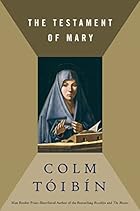First sentence:
"They appear more often now, both of them, and on every visit they seem more impatient with me and with the world."
Description:
Provocative, haunting and indelible, Colm Tóibín’s portrait of Mary presents her as a solitary older woman still seeking to understand the events that become the narrative of the New Testament and the foundation of Christianity.
In the ancient town of Ephesus, Mary lives alone, years after her son’s
crucifixion. She has no interest in collaborating with the authors of
the Gospel—her keepers, who provide her with food and shelter and visit
her regularly. She does not agree that her son is the Son of God; nor
that his death was “worth it;” nor that the “group of misfits he
gathered around him, men who could not look a woman in the eye,” were
holy disciples.
Mary judges herself ruthlessly (she did not stay at the
foot of the Cross until her son died—she fled, to save herself), and is
equally harsh on her judgement of others. This woman who we know from
centuries of paintings and scripture as the docile, loving, silent,
long-suffering, obedient, worshipful mother of Christ becomes a tragic
heroine with the relentless eloquence of Electra or Medea or Antigone.
Tóibín’s tour de force of imagination and language is a portrait so
vivid and convincing that our image of Mary will be forever transformed. -- from the inside flap
My thoughts:
This was a thought provoking book, depicting the Gospel story from a different point of view. I liked how throughout Mary talks about being a mother first and last.
Date read: 2/15/2013
Book #: 4
Rating: 3*/5 = good
Genre: Historical Fiction
ISBN-10: 1451688385
ISBN-13: 9781451688382
Publisher: Scribner
Year: 2012
# of pages: 81
Binding: Hardcover
LibraryThing page

No comments:
Post a Comment